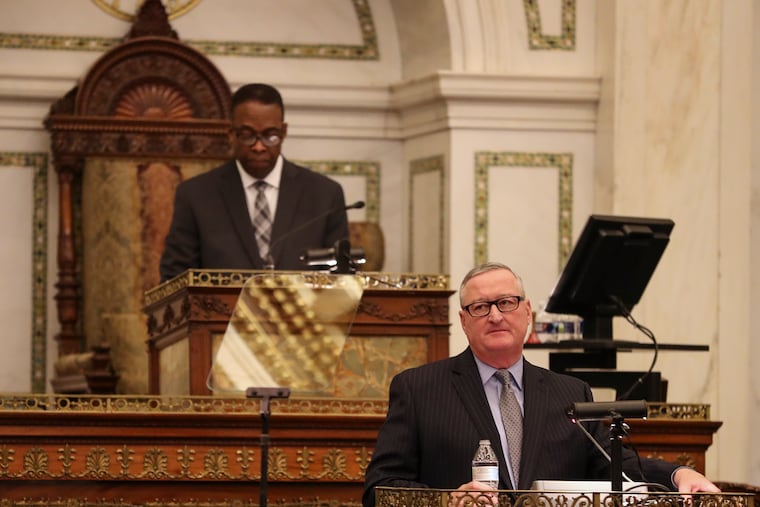Mayor Jim Kenney proposes a $5.2 billion budget. City Council may want to tweak antipoverty plans.
The mayor's budget includes $25 million for anti-poverty initiatives. But City Council may want to put money into different poverty-reduction programs.

Philadelphia City Council members voiced support Thursday for initiatives in Mayor Jim Kenney’s $5.2 billion spending plan with no tax hikes, but some suggested they may make changes or additions to his proposed antipoverty measures.
“Poverty is a focus for all,” said Council President Darrell L. Clarke. “The specificity of the dollars and where they will go will be determined over the course of the next 2½ months.”
Potential sticking points between Council and the administration include suggestions in a City Council poverty action plan released this week to form a public-private partnership to help residents living in poverty, and to partner with the United Way of Greater Philadelphia and Southern New Jersey to fund a basic income program that provides cash assistance.
Kenney’s budget includes $25 million in fiscal year 2021 for antipoverty programs, such as a new scholarship for community college students and rental assistance for residents living in poverty. A spokesperson for Kenney said the administration supports public-private partnerships and the work of United Way, but his budget does not include funding for such initiatives.
Kenney said he shared Council’s goal of reducing the number of Philadelphians living in poverty by 100,000 in the next four years.
“Our administration’s antipoverty strategy focuses on providing support to those in need now, helping Philadelphians raise their incomes, and investing in policies and programs that will break the cycle of inter-generational poverty for good," Kenney said.
Kenney’s first budget proposal of his second term continues the spending increases of his first term. If approved, the budget would translate to a 29% increase in city spending since he took office. And while Kenney pitched funding for a variety of initiatives, this year’s proposal marks a contrast from the start of his first term, when he asked Council to approve an ambitious and controversial tax on soda to fund bigger-ticket items.
Minutes before Kenney took the lectern to deliver his address, Council took a vote disagreeing with his stance on supervised injection sites. The room’s balconies were packed with protesters both for and against supervised injection sites as Council passed a resolution condemning the nonprofit Safehouse and the city for attempting last week to open a site in South Philadelphia without first getting community input.
» READ MORE: Philadelphia City Council helped corral opposition to the country’s first supervised injection site
Kenney acknowledged last week’s controversy, but vowed to continue his support for supervised injection sites.
“While I understand that some of you disagree with the policy, and have concerns with how and when community members were consulted,” Kenney said, “we will continue to work with advocates to support opening overdose prevention sites to save lives and help connect people to treatment.”
Kenney’s fiscal year 2021 budget proposal includes $3.3 million to combat the city’s opioid crisis.
Kenney also touted public safety initiatives and reforms for the city’s Police Department, now led by Police Commissioner Danielle Outlaw. Other spending in Kenney’s five-year plan includes $67 million for street sweeping and $1.4 billion for the School District of Philadelphia.
Kenney’s proposed six-year capital program includes $240 million for street paving, $60 million for improvements to the capping of I-95 near Penn’s Landing and to create a public park, and $16 million for the Philadelphia Zoo. (An article published Thursday misstated the length of time covered in the capital budget and the allocation for the zoo.)
Councilmember Maria Quiñones-Sánchez said she is happy the mayor is committed to expanding rental assistance programs to subsidize monthly payments for poor residents. But she said Kenney’s proposal to pilot a program offering cash stipends instead of rental assistance could be left to public-private partnerships like the basic income program pitched by United Way.
“That’s another opportunity that the bureaucracy feels its needs to control instead of, ‘There’s already this discussion happening, let’s support that discussion, let’s support a pilot,’ ” Quiñones-Sánchez said.
Mike Dunn, a spokesperson for Kenney, said the administration’s focus will be “developing, implementing, and evaluating the approaches of [its own program called] PHLRentAssist, and using that evaluation to better serve residents living in or near poverty.”
Councilmembers praised Kenney’s proposed investment in the Community College of Philadelphia, including $63 million over five years to establish the Octavius Catto Scholarship that could make the school tuition-free for thousands.
“We want to assist individuals who would like to move forward in their careers,” Clarke said.
Councilmember Cindy Bass said she liked much of the budget, but had some questions about spending.
“It’s increased a lot, and I think that folks in the neighborhood are concerned because they don’t see the impact where they live,” Bass said.
Republican Councilmember Brian O’Neill said that while he would prefer the city use its recent fiscal windfall to change its tax structure, he was happy to see the mayor leave the property tax rate unchanged.
“Do I think we should have taken some of that enormous money we’re spending additionally again and starting to become more competitive as a city? Yeah. But that’s not going to happen with Jim Kenney as mayor,” he said.
City Council will hold budget hearings in the coming months and must approve a budget by June 30.
Staff writer Sean Collins Walsh contributed to this article.